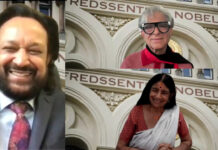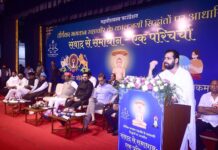
Spiritual aspirants complain that their devotional feelings for God and Guru vary throughout the day. Sometimes feelings are very strong but at other times there are no feelings at all. In fact there are many occasions when one may even have negative thoughts towards God. People find this fluctuation of sentiments very disturbing and feel uninspired to do sadhana.
We should not be disappointed if the mind troubles us and repeatedly runs to the world. Rather we should gain the knowledge that our devotional feelings vary because of the presence of three gunas of the material energy in our mind. This material energy called maya, has three modes, or gunas – sattva guna, rajo guna and tamo guna. The mind is made from Maya, and it too contains these three gunas. As these gunas vary throughout the day, a person’s thoughts too keep fluctuating.
To give an example, when sattva guna becomes prominent in the mind, you may start thinking, “this human form is precious and it should not be wasted in mundane pursuits, I must practice sadhna.” When rajo guna becomes prominent, you may think, “I must surely progress on the spiritual path, but what is the hurry?” When tamo guna dominates, you could think, “I am not really sure if there is any God or not.” Notice how the same person’s thoughts have oscillated from such heights to the depths of devotion.
It is natural for the mind to fluctuate because if it remained at the highest consciousness all day, there would be no need for sadhana.
Sadhana means to fight with the flow of the three gunas in the mind, and force it to keep devotional feelings towards God and Guru. Though the mind’s natural sentiments may be inclined towards the world, yet with the intellect, we force it into the spiritual realm. Initially, this may seem difficult, but with practice it will become easy. This is just as driving a car is difficult initially, but with practice it becomes natural.
We should see the mind as different from ourselves. So when the mind presents a negative thought to us, we should chastise the mind for harboring such thoughts which impede our devotion.
Saints say, “man ko mano shatru uski sunahu jani kuch pyare”
“Declare war on your mind. Do the opposite of what it says, and soon it will stop bothering you.”
Here are answers to some questions on practicing meditation, which help elevate the quality of our thoughts and hence calm our mind.
Question: Please tell about the benefits of meditation?
Swami Mukundananda: Meditation is a means of elevating the mind to divine consciousness, for reaching the ultimate goal of life, which is divine Love for God. All day long people work and live in a material environment that pulls their mind towards the world. The time spent in meditation absorbs the mind in devotion, and results in the purification of consciousness. The benefit of the surcharging of consciousness during meditation is reaped throughout the day.
In isolation from the disturbing elements of the world, if we learn to focus our mind on God for some time during the day, it will help us in sustaining divine consciousness throughout the day, even while we work in the world. Like the sandalwood tree, we too will live in the world but not let the world live within us.
There are other benefits of meditation too. Modern scientists estimate that we use only three percent of the mind’s potential. At present, our mind is scattered. Just as, if the channel button of a television set is spoilt, the channels keep changing sporadically. Similarly our mind too keeps flitting from topic to topic. But if we can learn to concentrate our mind, we can increase the utilization of our mental and intellectual faculties.
Q: There are so many different techniques and teachers of meditation that one could follow in today’s time. This also gets very confusing. Please explain what is the proper process of meditation?
SM: Different people in different cultures around the world use a variety of meditational techniques to improve their concentration. Some meditate on the breath, others on the centre of the eyebrows, other on the psychic centers in the spinal column, etc. These different meditations do improve the focus of the mind, but their benefits are incomplete and impermanent as they do not address the issue of purification of the mind.
As long as lust, anger, greed, envy, illusion, etc. reside in the mind, these forces again destroy the enhanced concentration. Thus, it becomes vitally important to understand how to purify the mind. For cleansing the mind, we must fix it on an object of meditation that is pure. The material realm is dominated by the three modes of nature – sattva, rajas and tamas (goodness, passion and ignorance). If the object of meditation is material, it cannot purify the mind. Beyond this material realm, is the divine realm of God – His names, forms, virtues, abodes, pastimes, and saints. If we fix our mind anywhere in this area, it will become pure. Shree Krishna instructed Arjun:
Mam cha yovyabhicharain… (Bhagavad Geeta)
“I am divine. If you fix your mind on me, it will rise above the three modes of maya.”
Very few people today have this knowledge that they are supposed to meditate upon God. Some techniques are even given the name “Transcendental Meditation”, but the object of meditation is not transcendental. True transcendental meditation is that we meditate upon the Lord who is transcendental to the material realm. Hence in JK Yog, we learn to meditate on the names, forms, virtues, pastimes, abodes and associates of God.
Q: How can meditation help to still the restless mind, it seems impossible to do so?
SM: The mind is such a machine created by God that it cannot remain empty; it keeps working on something or the other. To still the mind into a state of thoughtlessness creates an unstable condition for the mind that is difficult to maintain. This is just as while riding a bicycle, if you press the brakes and bring the bicycle to a standstill, you will fall to the left or to the right. But if you simply turn the handle to one side, the cycle will stop moving forward and very easily turn in the direction of the handle.
Meditational techniques for stopping the thought process and stilling the mind are highly unsuccessful. In Bhakti Yog, we do not try to still the mind; we divert it to God. Make the form of God as the basis of your meditation. In endless past lifetimes we have been habituated to interacting with forms. All the personalities we loved and all the objects we were attached to had forms, and so attraction to forms is a natural sanskar (tendency) of the mind. If we endeavor to meditate merely upon the name of God, or the syllable “Om”, the mind will not easily experience sweetness in it. But if we have the all-attractive form of God before us, the mind will effortlessly be drawn towards it. This meditation upon the form of God is called Roop Dhyan.
Q: If we make a form of God with our mind, it is only a material form. So how can it give the divine results that the meditator seeks?
SM: Often those who meditate upon a formless light believe they are engaging in transcendental meditation, and think that meditation on God’s personal form is a material meditation. However, the Ramayan states:
Gogochar jaham lagi man jayi…
“The mind is made from maya, and wherever it can reach is the realm of maya.” If you meditate upon the form of God, it is merely a conception of the material mind; it is not the divine form of God. Also, if you meditate on the formless Brahman, again it is merely a light created by your mind; it is not the divine light of God. Hence, transcendental meditation by the material mind is not possible, be it on the formless or on the personal form of God.
So do not worry that the form of God you are making with your mind is material. Use that form to increase your love for Him, by developing divine sentiments towards it. When you reach the state of “Complete surrender to God”, He will bestow His Grace upon you and make your mind divine. Then you will not need to create a form of God with your mind. You will see Him as He is, standing before you, in His actual divine form.
Therefore, in the meditation that you do at present, there is no stipulated form that you must focus upon. You can choose any form of God that you are attracted to, or create His form with your mind; but keep developing divine sentiments to increase your love for Him.
Q: In the writing of some Christian saints, emphasis is laid on contemplation. What is its place in devotional practice of the Hindu religion?
SM: Contemplation is called chintan, or manan, in the Vedas. It means repeatedly bringing any aspect of Divine knowledge to the intellect. First, we hear the knowledge of the scriptures from the Guru; this is called shravan. Then we contemplate on what we have heard or read; this is called chintan.
This chintan or contemplation helps to strengthen the knowledge in the intellect. It is one of the most potent means of illuminating the intellect with the light of divine knowledge. The power of chintan is such that if it is misutilized, it becomes chinta (worry). But the same power of contemplation, if properly directed, can lead to God-realization.
We could repeatedly think, “God alone is mine. He is so kind and merciful. He has been sitting in my heart since endless lifetimes. He is my eternal Father, Mother, Friend and Master.” Such contemplation will elevate the mind to sublime heights, enhance love for God, and boost devotional sentiments. Contemplation is thus an important part of the daily spiritual practice.
Swami Mukundananda is a world renowned spiritual teacher from India, and is the senior disciple of Jagadguru Shree Kripaluji Maharaj and founder of JK Yog. He has received his degrees in engineering from world renowned institutes in India, IIT and IIM. He has inspired people all over the world on the path of spirituality, holistic health, yoga, meditation, service to society and God realization. This year, Swamiji will be conducting weeklong programs in 30+ cities of USA from April onwards. For more information visit: http://www.jkyog.org/ or contact: secretary@jkyog.org
To attend Swamiji’s Yoga, Meditation and Spiritual Discourses in USA, see the schedule for your city: www.jkyog.org/2013
Swami Mukundananda






